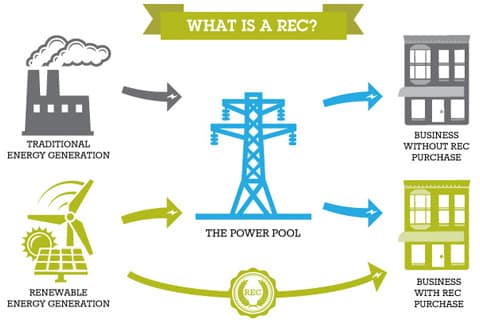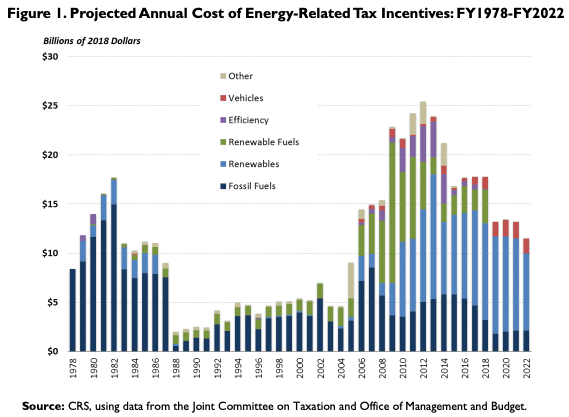What are Renewable Energy Credits or RECs?
Technical definition: renewable energy certificates (RECs) are a tradeable, market-based instrument that represents the legal property rights to the “renewable-ness”—or all non-power attributes—of renewable electricity generation. A REC can be sold separately from the actual electricity (kilowatt-hour, or kWh).

In simple terms, a REC is a “tag” to track a sum of electricity that was generated by renewables. 1 REC equals 1 Megawatt-hour of electricity generated by renewables, from solar and wind to natural gas and nuclear. An REC represents the clean energy that went into the grid from renewables.
As an example, if a company buys a REC, it is purchasing the legal property rights to a sum of renewable energy. This company is not actually receiving the exact tangible energy produced by, say, a wind farm. But by purchasing the REC, the company now owns the tag that represents the “renewable aspect” of the energy. The company can therefore claim that they have operated with renewable energy.
RECs are a way to track how much renewable energy has been produced and who has invested in and purchased its production.
Different Types of RECs

US Energy Disruption Broken Down
Source: U.S. Energy Information Administration, Annual Electric Power Industry Report
Not all RECs are created equal. And the value of a REC is determined by several factors:
- Location
- Type of generation
- Certification
- Year of generation, and more.
Generally, local RECs have a higher price, while other RECs can be purchased at the state, regional, or national level at a lower price.
This is typically due to the type of generation tied to the REC. REC’s sold locally are more likely to be solar or wind, while national REC’s are more likely to be less sustainable forms.
The type of generation also influences REC value. Solar RECs are usually the most expensive and sought after, followed by wind. In many cases, Solar RECs, or SRECs will be created by State Government’s to allow organizations to access specific tax carve outs for Solar & Solar related projects. For more information on SRECs check out this article from the EPA:
State Solar Renewable Energy Certificates
Next is biofuel, energy produced from renewable natural gas (RNG) or biomass like wood chips and landfill gas. “Any source” is the least expensive option, but is most likely landfill gas or trash-burner RECs, which are the least sustainable and might not look good on your report.
Green-e certified RECs are also more valuable, as they meet certain quality requirements:
- proof that the energy source is a renewable generator connected to the grid
- it is less than 15 years old
- has been properly tracked and retired (once purchased, RECs are retired so they aren’t accidentally double-counted).
As Vice President of Renewables Origination & Partnerships at Transparent Energy, David Braun, says, the most important thing to understand is why you’re buying RECs: “Want to support local renewable projects and job development or impact the environment in your area? Pay more for an in-state REC. Want to green your energy purchase at the lowest cost? Consider buying low-cost National RECs. Looking to highlight your greening efforts in your corporate sustainability report? Shop the market for RECs tied to the kind of renewable projects you want to align your brand with and trumpet to your investors, employees, and other stakeholders.”
How to Purchase RECs
You can purchase RECs through your electrical utility, directly from outside suppliers, or through Power Purchase Agreements (PPAs).
In some states with green power programs, utilities buy RECs and charge customers a premium for green energy.
RECs can also be purchased directly from outside suppliers certified by Green-e.
A Power Purchase Agreement is a contract between a business and the developer of a new renewable energy project, usually spanning 10-20 years. This is a great option for a business that wants to make a longer-term impact by directly supporting the financing and development of a new renewable energy source.
Examples of Companies that purchase RECs
Nature’s Path
Many companies purchase RECs to meet their electricity needs with clean energy. One example is Nature’s Path, a leader in green tech energy and sustainable food manufacturing.
If you’re not familiar with Nature’s Path snacks and breakfast cereals, they are raising the bar on what it means to be sustainable! And when it comes to RECs, Nature’s Path purchases wind RECs to meet 100 percent of their energy needs. Learn more about what Nature’s Path does in our Sustainability Stories blog.

Jackson Family Wines
Jackson Family Wines (add a hyperlink to blog) is a global leader in sustainable winemaking. they’ve purchased RECs for years to meet the company’s annual electricity usage for all its operations.
The winery is now taking it a step further by expanding its on-site renewable energy projects, like the kinds VECKTA helps food and beverage companies develop. Installation projects including a wind turbine and floating solar arrays are to help power more than 50% of the winery’s annual electricity needs by 2025!
Are RECs Viable? Short-term Vs. Long-term
RECs are viable options for companies to invest in renewable energy and meet sustainability goals immediately. PPAs are especially beneficial as they directly allow the creation of new renewable projects.
But most RECs do not encourage new projects, and many of them lack transparency in their source and environmental impact. As more companies move to net-zero, these low-cost, low-quality RECs are being steadily weeded out of the market. This reduces the supply across all REC types and in turn, makes higher-quality RECs more expensive.
So while purchasing local, Green-e certified RECs is a great way to benefit the environment and meet your company’s sustainability goals today, you need to plan for the future.
If you are investing in renewable energy to fight climate change and support your company’s long-term interests, RECs are nothing more than a stepping stone.
We need more renewable energy coming online and we need to see leaders taking a balanced approach. What does that look like? A combination of the following:
- Utilizing some RECs
- Using PPAs
- Self-generation
The most effective, long-term solution to clean energy? Self-generation.
Innovative Businesses Deserve Innovative, Sustainable Solutions
As businesses begin to invest in innovative technologies and set sustainability goals, it is vital their energy supply can reliably support these efforts. Take Anderson Valley Brewing Company (AVBC), the world’s first solar-powered brewery. Their team continues to seek out new clean tech ways to brew the best beer yet minimize their impact on the planet.
“We are quality-obsessed and relentlessly innovative. Energy as we’ve always thought about it, simply from the grid, is changing. Breweries and wineries that embrace this change and move in the direction of on-site energy production will not only cut carbon emissions but save millions,” says Kevin McGee CEO at Anderson Valley Brewing Company.
How VECKTA Can Help?

Businesses looking to develop onsite energy can utilize VECKTA’s marketplace to help identify the onsite potential for most companies. And we can help you reduce the need for RECs as these systems come online. VECKTA works with companies like Anderson Valley Brewing Company to take control of their energy by developing customized onsite energy solutions.
Our marketplace matches project needs and partners for the most cost- and schedule-efficient results. At VECKTA we can help you streamline the technical and financial requirements of designing and installing a microgrid, helping you identify the most beneficial onsite solutions for your company.
If you’re curious about how we can work together, we’d love to chat.